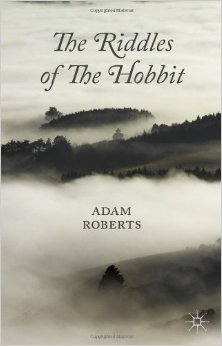The Riddles of the Hobbit, by Adam Roberts, Professor of Nineteenth-century Literature at Royal Holloway, University of London, and author of more than a dozen science fiction novels, is a critical examination of the notion of “the riddle” as it threads through The Hobbit, and across the larger landscape of Tolkien’s Middle-earth. This slim volume, barely 168 pages of text, packs a fascinating punch. Roberts brings his scholarly expertise to bear on the subject, informed by his experience as a novelist, treating riddles as the serious business they were in the Anglo-Saxon world that was so important to Tolkien and his work. In November, 2013, Lily Milos shared an exclusive look at The Riddles of the Hobbit in this story on Middle-earth News.
The book’s discussion follows riddles and riddling in numerous contexts, beginning with the statement set down by Tolkien himself in his 1947 letter to Stanley Unwin: “The Hobbit was after all not as simple as it seemed” (The Riddles of the Hobbit, page 1). Roberts adds his voice to that position, stating, “The Hobbit appears to be a straightforward children’s adventure tale; but it is actually much less simple, rather more ironic than that” (The Riddles of the Hobbit, page 4). Through the course of eleven chapters, Roberts explores this ironic, concealing mode of communication — the riddle — turning the concept around and around, upside down, and inside out, tying together Norse myth, Anglo-Saxon literature, Bilbo and Gollum’s riddle game, Tolkien’s Catholic worldview, and much more. Roberts looks at many different riddles, including: What does “Good morning” mean? What is a burrahobbit? What is a pocket? What is the magic of the One Ring? And, not least, what is a hobbit? Throughout, Roberts highlights Tolkien’s ingenuity and playfulness, a playfulness that The Riddles of the Hobbit takes quite seriously.
The Riddles of the Hobbit fascinated me from beginning to end. The book is beautifully researched and written, and is filled with intriguing hypotheses and innovative perspectives. I hesitate to say too much about those hypotheses, for fear of robbing potential readers of the pleasure of unraveling those delightful threads. I will offer one teaser to illustrate Roberts’ ingenuity of argument in the book. He suggests that Bilbo and Gollum’s famous riddle game is much more than an entertaining episode in The Hobbit, iconic and beloved as it is. Instead, Roberts proposes that the riddle game forms a “meta-riddle,” a larger riddle that over-arches larger literary territory. He goes on to propose two answers to that meta-riddle, one that relates to The Hobbit as a novel, and the other to the broader reaches of Tolkien’s Middle-earth.
I have been a Tolkien reader for many years, and have read every scrap of Tolkien’s writing that I can lay my hands on, some of them over and over again. But with all that, this slender book held more than one “lightning bolt” moment for me. By that, I mean those times when the author expressed his ideas with such incisive clarity that he brought his ideas into sharp focus in my mind, leaving me gasping at the insight. Perhaps those ideas had been lurking there before, but Roberts masterfully brought them to the surface. I absolutely recommend this book for readers with an interest in the scholarly side of Tolkien’s world and work. I hope that you find it as engaging as I did.
Adam Roberts, The Riddles of the Hobbit, 2013, Palgrave Macmillan.
Contents:
List of Illustrations
Introduction
1 The Anglo-Saxon Riddleworld
2 Cynewulf and the Exeter Book
3 Riddles in the Dark
4 The Riddles of the All-Wise
5 The Puzzle of the Two Hobbits
6 The Riddle of Bilbo’s Pocket
7 The Riddle of the Ring
8 The Lord of the Rings and the Riddle of Writing
9 The Volsung Riddle: Character in Tolkien
10 The Enigma of Genre Fantasy
11 . . . And Back Again?
Notes
Bibliography
Index



